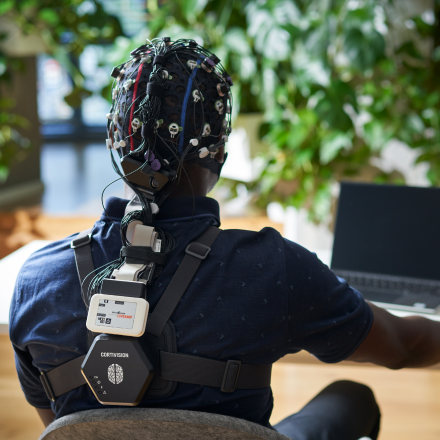
What is a Brain-Computer Interface (BCI)?
A Brain-Computer Interface (BCI) is a system that enables direct communication between the brain and an external device. BCIs translate neural activity into commands that can control devices like prosthetics, communication aids, or computer systems. BCIs have applications in assistive technologies, rehabilitation, and research on neural pathways, with increasing interest in their integration with other neuroimaging modalities for better signal interpretation.
How fNIRS Enhances BCI Research
Functional Near-Infrared Spectroscopy (fNIRS) offers a complementary approach to BCIs by measuring changes in brain oxygenation linked to neural activity. Unlike electrophysiological methods like EEG, which capture electrical signals, fNIRS provides a hemodynamic perspective, detecting oxygenated and deoxygenated hemoglobin in the cerebral cortex. This adds a new dimension to understanding brain function, particularly in motor imagery, cognitive load, or decision-making tasks used in BCI research.
Advantages of fNIRS in BCI Studies
- Non-Invasiveness: fNIRS is a completely non-invasive technology, making it safe and comfortable for participants. This is especially important in longitudinal studies or for individuals with medical conditions.
- Portability: Systems like Cortivision’s Spectrum C23 and Photon Cap are lightweight and mobile, enabling experiments to be conducted outside the lab in naturalistic settings.
- Compatibility: fNIRS integrates seamlessly with EEG, offering a multimodal approach that combines electrical and hemodynamic data for more comprehensive neural signal decoding.
- Ease of Use: Cortivision’s systems are user-friendly, with customizable montages and fast setup times, allowing researchers to quickly adapt to different experimental designs.
- Cost-Effectiveness: Compared to more complex imaging techniques like fMRI, fNIRS offers a practical and accessible solution for BCI research without sacrificing data quality.
Practical Applications
Cortivision’s fNIRS systems are ideal for exploring basic BCI applications, such as training prosthetics through motor imagery, assessing cognitive load in real-time, or enhancing neurofeedback protocols. By linking brain activity to device control, fNIRS expands the possibilities for innovative solutions in assistive technology and rehabilitation while maintaining participant comfort and flexibility.
Cortivision empowers researchers with the tools to push BCI studies forward, enabling groundbreaking discoveries in the field of human-computer interaction.